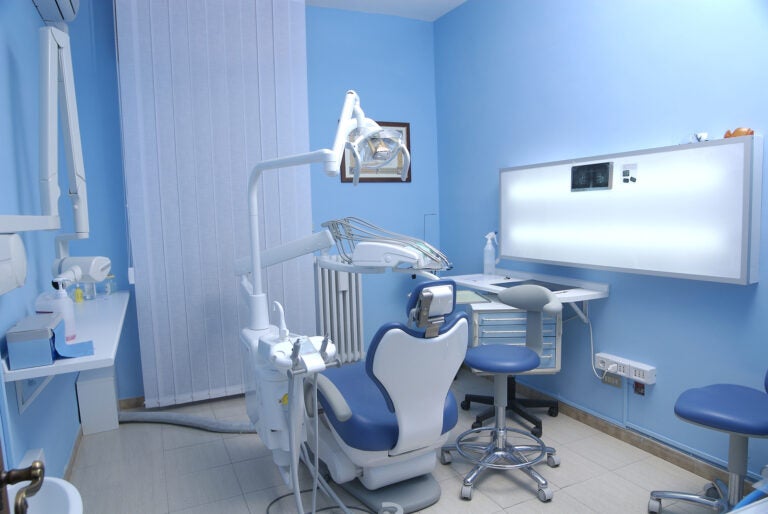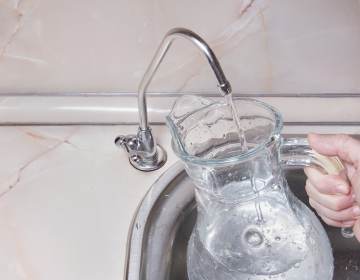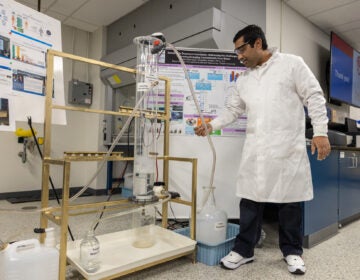New Jersey dentists advocate for fluoridated water as debate over the chemical continues
New Jersey has one of the lowest fluoridation rates in the U.S. Only about 16% of New Jersey residents have fluoridated water, compared to the national average of about 75%.
Listen 1:15
Dentists in New Jersey are calling for fluoridated water. (bravajulia)
From Camden and Cherry Hill to Trenton and the Jersey Shore, what about life in New Jersey do you want WHYY News to cover? Let us know.
Dr. Elisa Velazquez said the number of young patients she sees with cavities at her Ocean County, New Jersey dental practice is staggering. The dentist is one of several statewide, and across the country, advocating for fluoridated drinking water.
About three-quarters of U.S. residents have fluoridated water, which has been shown to reduce cavities. However, most New Jersey residents are not exposed to fluoride in drinking water, and dentists say it’s impacting kids’ health.
“We know statistically that it’s actually one of the most chronic diseases, because cavities are considered a bacterial disease in the nation. And in New Jersey, it really is a significant problem,” said Velazquez, board president of the New Jersey Dental Association.
A 2022 health department study found New Jersey third graders had higher rates of untreated tooth decay than the national average. Though several factors can cause cavities, including genetics, diet or lack of insurance, dental professionals say cavity rates in New Jersey could be partly caused by fluoride-free water.
New Jersey has one of the lowest fluoridation rates in the U.S. Only about 16% of New Jersey residents have fluoridated water, compared to the national average of about 75%.
For decades, the New Jersey Dental Association has called upon legislators to require water providers to add fluoride to the state’s drinking water. However, a number of bills attempting to do so have failed after getting pushback from some water providers and environmental groups.
“Dental disease is a serious problem,” Velazquez said. “It’s painful, and it could be traumatic for children to undergo the necessary therapies and treatments. And then it could get expensive for parents, and our goal is that people be cavity-free and that they be healthy.”
Fluoride-free water
Over the years, some New Jersey residents have resisted fluoride because they don’t believe the government should mandate what’s in their water or because they don’t believe the benefits outweigh the risks.
Currently, New Jersey law allows water providers to make their own decisions about fluoridation.
However, customers must unanimously consent before a water provider can add fluoride to the drinking water, said Oleg Kostin, director of statewide operations for New Jersey American Water. The investor-owned utility only serves fluoridated water to municipalities that historically used the chemical before acquisition.
Kostin said he prefers not to feed fluoride into the water supply because it involves the use of hydrofluorosilicic acid, a highly corrosive chemical. He said it’s one of the reasons smaller water providers in New Jersey choose against fluoridation.
“You have to have the facilities to handle that. It has to be well ventilated, you have to be completely protected from head to toe — face shields, goggles, chemical protective clothing, respirators — because you do not want to be breathing this chemical,” Kostin said.
In the early 1900s, public health officials concluded discolored teeth among residents of Colorado Springs were caused by high levels of naturally occurring fluoride in the spring water. However, the residents also had lower rates of tooth decay. Health experts determined that adding low levels of fluoride to drinking water could prevent cavities with little side effects.
Towns and cities across the U.S. began fluoridating their water, following Grand Rapids, Mich., in 1945. In a few years, health officials documented a 60% reduction in tooth decay.
Since then, numerous studies have shown fluoride can reduce cavities because it strengthens enamel during the formation of teeth, and it can remineralize adult teeth.
Conspiracy theories about fluoride have been around since the beginning. However, the anti-fluoride movement was amplified in recent months as President Donald Trump’s Health and Human Services secretary nominee, Robert F. Kennedy Jr. called for removing fluoride from public drinking water. Kennedy has alleged the chemical can cause health problems such as bone cancer and neurodevelopmental disorders.
During his confirmation hearing this week, he referenced a recent study that found an association between fluoride and lowered I.Q. Researchers have cautioned none of the study’s analyses were conducted in the United States, where recommended fluoridation levels in drinking water are very low.
Exposure to high levels of the chemical could impact a person’s health, said Dr. Mary Beth Giacona, a professor of pediatric dentistry at Rutgers School of Dental Medicine. However, she said there are no health effects associated with the very low levels of fluoride found in drinking water in the U.S.
“I think the evidence is there to say that at the levels that we are fluoridating our water supplies, it does not cause harm,” Giacona said.
Last year, another study linked fluoridated water during pregnancy and increased neurobehavioral problems in children. One of the study’s authors, Howard Hu, has since advocated for some policy changes, such as limiting fluoride exposure during pregnancy and the first year of a child’s life.
“As a precaution, I think women during pregnancy should try to limit their known exposures to sources of fluoride,” said Hu, a professor of preventive medicine at the University of Southern California,
Some opponents of fluoridated water believe toothpaste, mouth rinses and professional treatments are a safer alternative. However, dentists argue fluoridated water ensures everyone has access.
“There are large segments of our population that cannot afford to and don’t have access to other interventions,” Giacona said. “Whereas, if you fluoridate a community’s water supply, everybody, no matter what the household income is, no matter what race or religion or ethnicity they are, has access to this effective preventive measure.”
Velazquez expressed concern that warnings about fluoride in drinking water might also reduce the use of fluoridated dental products in New Jersey.
“They hear … someone’s telling [them] fluoride is not good, then they stop everything,” she said.
Velazquez encourages people to discuss best dental practices with their providers.
“There’s so many factors, and that’s not something that should just be Googled,” she said. “That should be something that each parent talks to their dentist about for that individual child.”

Get daily updates from WHYY News!
WHYY is your source for fact-based, in-depth journalism and information. As a nonprofit organization, we rely on financial support from readers like you. Please give today.






